A student heard Clara Beck, organist at St. Thomas Church in Braddock. The student, Robert Martin Murphy, carried a love of organ music throughout his life. He became Rev. Robert Murphy, pastor at Saint James Parish from March 22, 1961, to December 1, 1981.
The 1979 Sacerdotal Golden Jubilee Program notes, “One of the very first things done by Fr. Murphy upon his arrival at St. James was to arrange for the installation of the beautiful new organ. Father has since begun to learn how to play the organ.” By 1979, “If the right moment is chosen, it is possible to slip quietly into St. James Chapel and find Father Murphy seated at the organ in concert.”
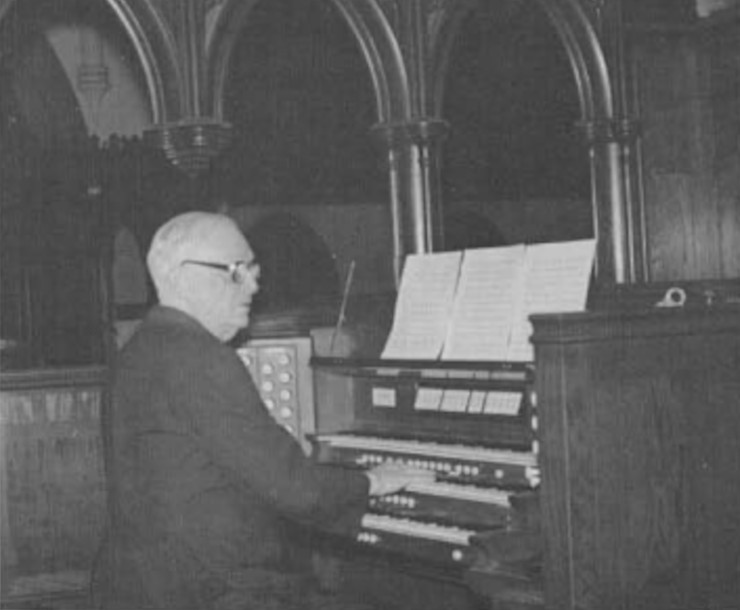
The installation of the Möller Organ, Opus 9628, began after Easter in 1962 and was completed in July. The organ is a memorial to Rev. Stephen A. Walsh who guided the construction of St. James Church.
The Pittsburgh Catholic described the upcoming ceremony, open to the public, for September 23.
The program will include the blessing and a homily by Bishop Wright, a selection of musical compositions, and the premier of “Jubilate Deo” by Frederick M. Breydert, commissioned by St. James. St. James choir will sing, accompanied by Miss Carol Martire, organ, and Mrs. David Volker and Mrs. John Wolff, violins. . . .
Among those who will take part in the blessing ceremony will be Fr. Robert M. Murphy, pastor St. James; Fr. Henry J. McAnulty, C.S.Sp., president of Duquesne University, and Fr. Thomas W. Jackson, secretary of diocesan music commission.
St. James scheduled four public recitals in the autumn of 1962: Flor Peeters of Belgium, Ernest White of Syracuse, Carol Ann Martire of Pittsburgh, and Donald Beikman.
The organ has these stops:
II. GREAT (right side)
16 Quintaton
8 Prinzipal [this is the organ sound rather than the imitation of another instrument, usually a metal pipe, appears in each organ division]
8 Rohrflöte
4 Octave
4 Spitzflöte
22/3 Twelfth
2 Octavin [a harmonic flute]
51/3 Sesquialtera II (51/3, 31/5)
11/3 Fourniture IV
Harmonics IV
8 Trumpet [“a loud chorus reed stop, generally a single rank, with inverted conical resonators”]
Tremolo [from the Italian, a device that varies the wind supply to an organ division or sometimes the entire organ, has a vibrato, the pitch and amplitude of the sound fluctuates]
Great Unison Off
Swell II to Great
Pos to Great 16, 8
III. SWELL I (right side)
8 Gemshorn [“a foundation stop of conical construction,” combination of flute and string]
8 Gemshorn Celeste [undulating celeste made from two ranks of gemshorn, can have a clear and shining timbre]
4 Principal
2 Blockflöte [resembles tone of a woodwind recorder, the name is German for recorder]
16 Bombarde [a powerful reed stop with a brassy timbre]
8 Trompette
4 Clarion [a reed stop]
Tremolo
Swell I 16, Unison Off, 4
Great to Swell
Positiv to Swell
East Transept:
I. POSITIV (left side)
8 Gedeckt
4 Principal
4 Koppelflöte
2 Prinzipal
11/3 Larigot
1 Sifflöte [maybe from zuffolo, Italian for shepherd’s fife]
Cornet II
Zimbel II
16 Holzregal
8 Holzregal
4 Oboe Schalmei [from a shawm, a double-reed instrument, forerunner of the oboe]
Tremolo
Positiv 16, Unison Off
Great to Positif
Swell I to Positif 8, 4
Swell II to Positif 8, 4
III. SWELL II (left side)
16 Rohrgedeckt
8 Rohrgedeckt (ext.)
8 Gambe
8 Gamba Celeste
4 Nachthorn [translates to night horn]
22/3 Nazat
2 Geigen [from geigen, German for violin]Plein Jeu III [three rank stop that is used with foundation stops rather than alone, enhances harmonics of the fundamental pitch]
Tremolo
Swell II 16, Unison Off, 4
PEDAL
16 Prinzipal
16 Bourdon [a wooden flute stop related to a French word for buzz]
16 Quintaton (Gt.)
16 Rohr Gedeckt (Sw. II)
8 Principal (ext.)
8 Bourdon (ext.)
8 Quintaton (Gt.)
8 Dolce Flute [a dolce is a soft stop]
8 Rohr Gedeckt (Sw. II)
4 Principal
4 Rohrgedeckt (Sw. II)
31/5 Terz
2 Doublette (ext.)
13/5 Terz (ext.)
Grave Mixture II
Rausch Quinte II (ext.)
16 Posaune
16 Holzregal (Pos.)
8 Trompette (ext.)
8 Holzregal (Pos.)
4 Holzregal (Pos.)
Great to Pedal
Swell I to Pedal
Swell II to Pedal
Positiv to Pedal
The poster for the 2017 Afternoon of Hope Organ Recital ” describes the Möller Organ,
Opus 9628 is a medium-to-large instrument, with 3 manuals, 5 divisions, 54 ranks, and 3,189 pipes. It is likely the largest organ ever constructed in Wilkinsburg, and is certainly Wilkinsburg’s largest currently playable pipe organ. It is remarkable for its unusually large Pedal division and its divided Swell, with separately expressed divisions on the left and right sides of the chancel.
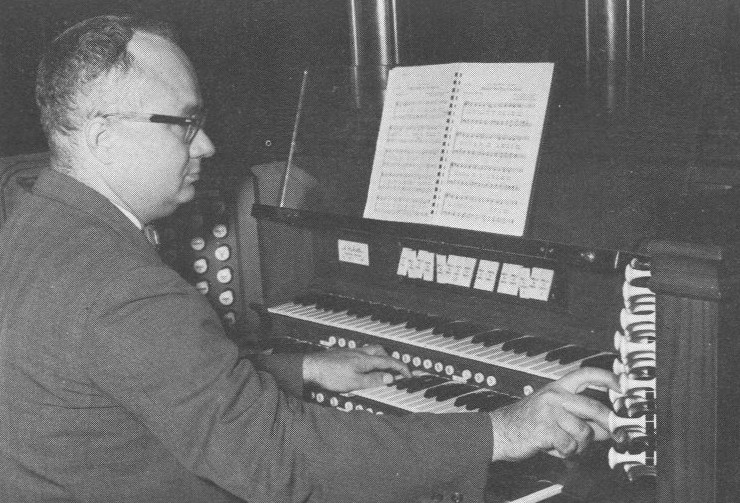
The Pittsburgh Catholic in 1965 notes,
The second of two free organ recitals at St. James Church, Wilkinsburg, will be played Tuesday, May 11, at 8:30 p.m. by Donald Beikman, organist of St. James Church and assistant professor of music at Duquesne University.
The program will include a Passacaille of Frank Martin, the variations on Jesus Christ, Our Saviour, by Samuel Scheidt, and the Sonata in G Minor of C.P.E. Bach. The program will conclude with a group of French works written around 1900. the public is invited.
Donald Beikman earned a doctorate in musicology from the University of Chicago. He taught organ at Duquesne University and later taught music at the University of Pittsburgh. The College of General Studies at Pitt presented him with an Apple for the Teacher award. He liked to visit bookstores dealing with rare and used books in a search for hymnals and partbooks. Wikipedia tells, “A partbook is a format for printing or copying music in which each book contains the part for a single voice or instrument, especially popular during the Renaissance and Baroque.&rdquo. He had an interest in a wide range of music including 15th-century music and he taught a wide range of courses.
He returned to his home state, Indiana, and became organist at the Catholic Church of the American Martyrs in Scottsburg.
Homer Wickline, organist and music director at Second Presbyterian Church, played a multitude of of free and open to the public concerts at St. James Church.
Deborah Deasy writes in “Organ Recitals Feed Your Imagination For Trip Abroad,”
Ah, the big, majestic sound of a pipe organ! It can soothe your soul, tingle your spine.
Within the deep, dark interior of St. James Church, Wilkinsburg, at 3 p.m. any Sunday, it can transport you to a grand European cathedral.
Homer Wickline is the pilot, read to command the keys.
At first the notes lurch softly from way down on the scale. You look for a villain. Gradually the tones climb. The pace quickens. Suddenly the music is roaring and tumbling with all the force of a steam locomotive rolling full throttle. Surely they can hear it in heaven.
Abruptly it halts and all that remains is faint winter light pushing through the richly blue stained glass all around you.
It is requested there be no applause.
Wickline likes it that way. The way he sees it, clapping ruins the mood. It detours the soul.
A true musician, with about 50 years of performing behind him, Wickline never bores you with the same songs. He prides himself on variety, having never repeated a program in the nine years he has been performing weekly at S. James Church.
It seems like so much for the engaging bachelor with a million stories and undaunted sense of humor. Despite his post-performance wet palms, he says it isn’t.
“I love the organ. I don’t look at it that way (as work). It has made me grow in every way imaginable.”
One recent Sunday a handful of folks showed up for the recital. The small number made no difference to Wickline; in never does.
“I never care how many people come, ” he says. “I don’t think that’s important. This is not the reason for doing it.”
What’s the reason then?
“I want people to be interested in the organ again.”
Wickline is Pittsburgh’s lone regular organ recitalist. Others play once here, once there.
He urges anyone interested in classical music to sample his show. Bring a receptive mind, he asks. You may hear anything written from the 11th century right on through the 10th. Did you know more music has been written for the organ than any other instrument?
Wickline works five hours a day preparing for his weekly recital.
Chances are you won’t recognize the composers he chooses, but worry not. Wickline’s program notes provide plenty of background and food for thought while you listen.
Wickline did not hesitate to share his viewpoints on music.
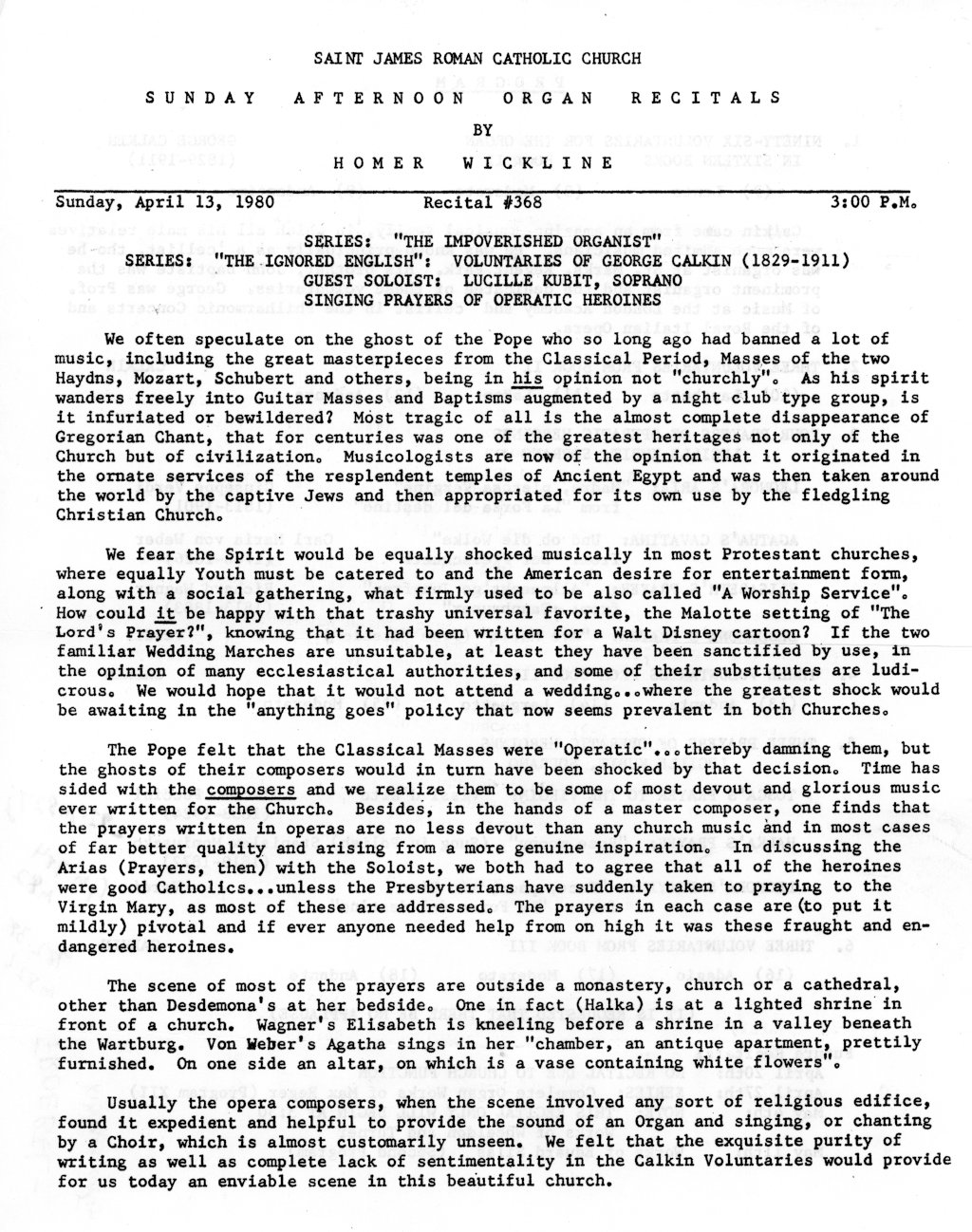
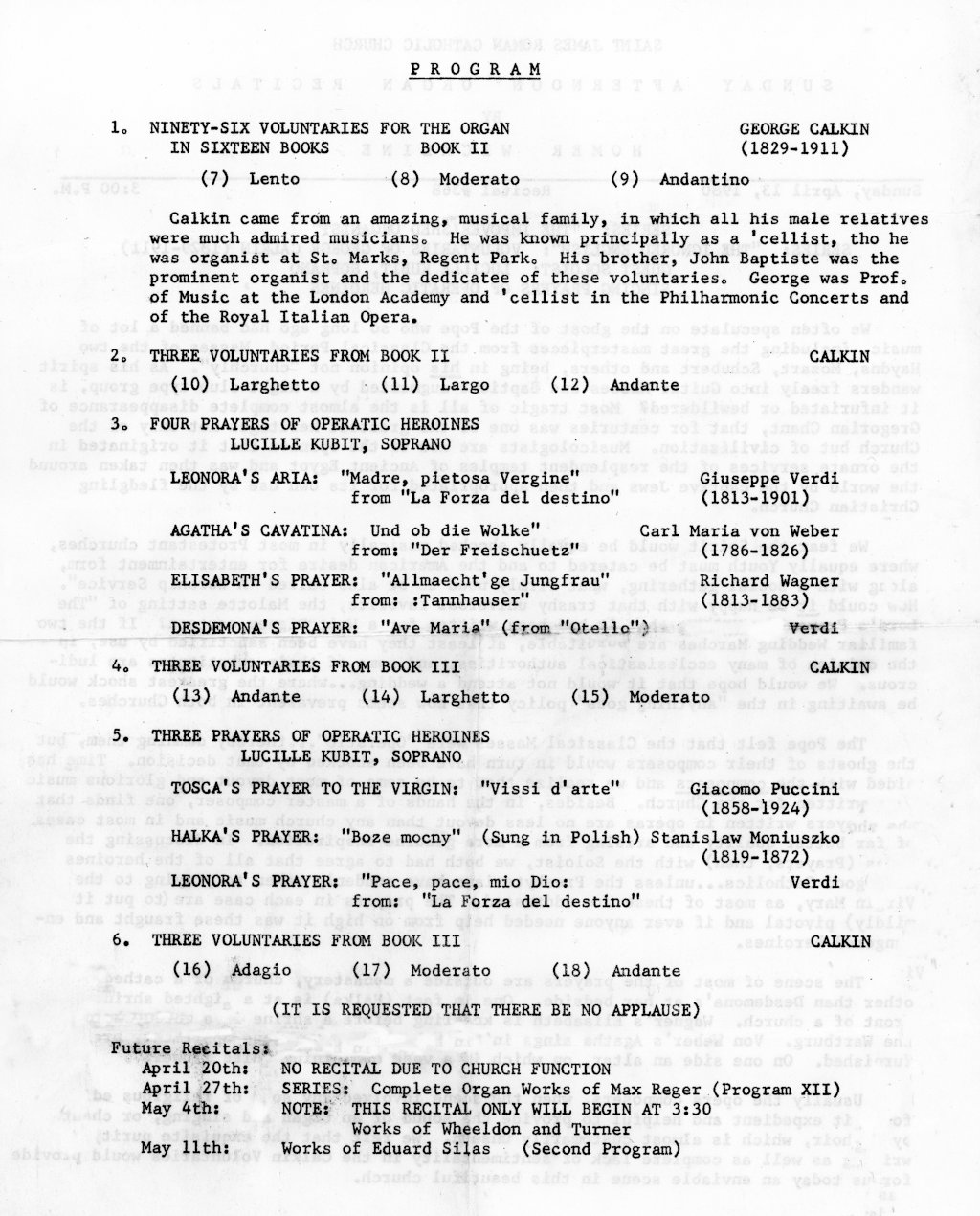
Many organists have given recitals at the church over the years.
In 2010 the Organ Historical Society National Convention met in Pittsburgh for six days of listening to classic pipe organs throughout the area. St. James Church greeted the musicians and music enthusiasts with a peal of bells and then William Headlee gave a recital. Among the works listed in the convention book are Johann Pachelbel’s “Prelude in D Minor” and “Ciacona in D Minor,” Josef Hector Fioccol’s “Adagio,” Johannes Brahml’s “O Welt, ich muß dich lassen,” and Olivier Messiaen’s “Dieu parmi nous.”
The “Afternoon of Hope Organ Recital” calls attention to a deterioration between 2010 and 2019 in the organ including ciphers. A cipher is a note that plays and keeps on playing despite the organist’s best intentions. Needless to say, this is a nightmare for the organist.
Pipelines, the newsletter for the Pittsburgh Chapter of the American Guild of Organists, tells, “This benefit recital by local organist Michael R. Kearney will demonstrate the impressive extent of the organ’s remaining tonal capabilities and kick off a campaign to revitalize this beautiful instrument in the heart of Wilkinsburg.”In addition to dead notes and frequent ciphers throughout the organ, the Holzregal and a few other ranks are completely unplayable, and pneumatic leaks have rendered the combination action and general cancel inoperable. The organ needs proper restoration and maintenance in order to continue singing its lush harmonies and diverse tone colors for generations to come.
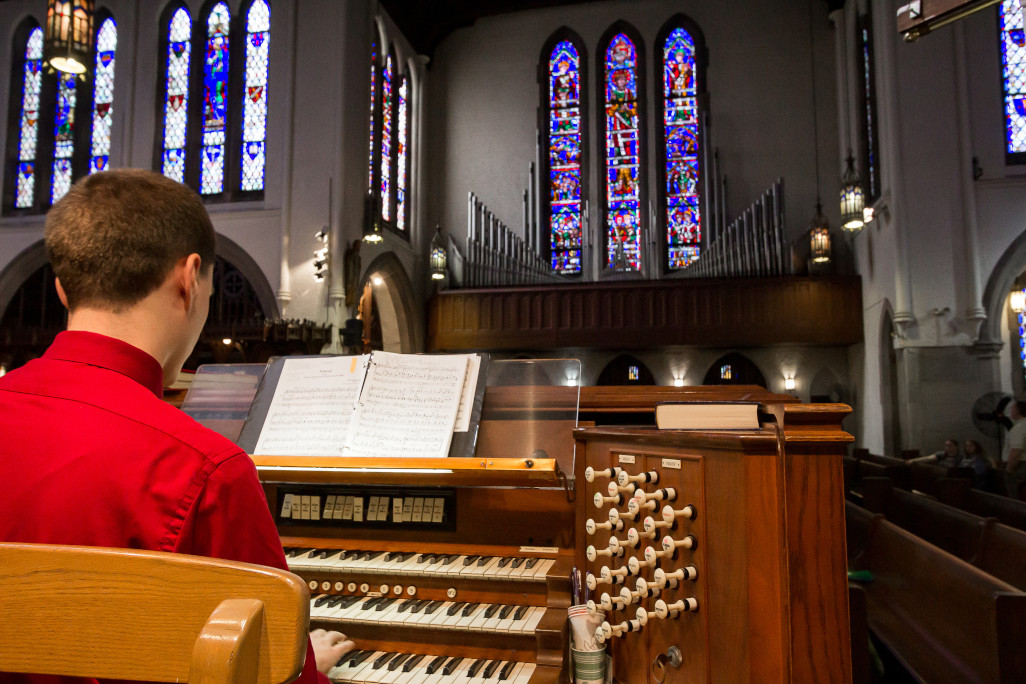
______
“To Bless New Organ In Wilkinsburg,” Pittsburgh Catholic, September 20, 1962, p. 10.
Organ Historical Society Convention Handbook, Organ Historical Society National Convention 2010 Pittsburgh, Pennsylvania, p. 27–28.
Frank Rippl, “55th OHS National Convention, June 21–26, 2010, Pittsburgh;” The Diapason, April 2011, p. 22.
“Partbook,” Wikipedia. https://en.wikipedia.org/wiki/PartbookDeboarah Deasy, “Organ Recitals Feed Your Imagination For Trip Abroad, ” Pittsburgh Press, January 25, 1979, p. C-1.
“List of pipe organ stops,” Wikipedia.
https://en.wikipedia.org/wiki/List_of_pipe_organ_stops
&ldquotremulant,” Wikipedia.
https://en.wikipedia.org/wiki/Tremulant
“Catholic Community of East End of Pittsburgh Presents an Afternoon of Hope Organ Recital,” a poster in pdf form.
https://d2y1pz2y630308.cloudfront.net/21498/documents/2019/4/April%2027%20Recital-3.pdf
“An Afternoon of Hope: An Organ Recital for the Wilkinsburg Community” Pipelines, Pittsburgh Chapter of the American Guild of Organists, April 2019, p. 5.
Wilkinsburg Public Library Digital Archives:
“Sacerdotal Golden Jubilee of the Reverent Robert M. Murphy, 1929&ndash1979,” October 21, 1979.